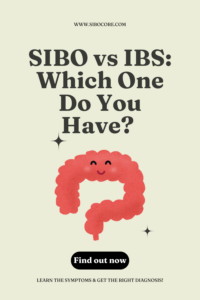If you’ve ever experienced digestive discomfort like bloating or stomach pain, you may have heard of SIBO (Small Intestinal Bacterial Overgrowth) and IBS (Irritable Bowel Syndrome). These conditions are often confused, leading to frequent misdiagnosis, but understanding their differences is key to finding the right treatment. I myself spent 12 years in search of the perfect IBS remedy before I found out I had actually SIBO. In this guide, we’ll explore how to identify the differences between SIBO and IBS, discuss symptoms, and review treatment options so you can make informed decisions for your gut health.
Understanding IBS: Symptoms, Types, and Causes
Overview of Irritable Bowel Syndrome
IBS is so common nowadays that we’re all joking about it and making memes. But to be clear: Irritable Bowel Syndrome (IBS) is a pretty common functional gastrointestinal disorder that affects the large intestine and can be life-altering! It’s characterized by a group of symptoms that often occur together, affecting bowel habits and causing significant discomfort. IBS is a chronic condition that can vary in severity, and while it can be quite disruptive, it does not lead to permanent damage to the intestines.
Types of IBS and Common Symptoms
There are three main types of IBS, categorized based on the predominant bowel habits:
-
- IBS-C (Constipation-Predominant): Individuals experience infrequent bowel movements, often accompanied by straining and hard stools.
-
- IBS-D (Diarrhea-Predominant): Individuals frequently experience loose or watery stools, often with urgency.
-
- IBS-M (Mixed Type): Individuals experience a combination of both constipation and diarrhea.
Common Symptoms:
-
- Abdominal pain or cramping, often relieved by a bowel movement
- Bloating and gas
- Changes in bowel habits, such as diarrhea, constipation, or alternating between the two
- Mucus in the stool

Understanding SIBO: Causes, Symptoms, and Impact on Gut Health
Overview of Small Intestinal Bacterial Overgrowth
SIBO or Small Intestinal Bacterial Overgrowth occurs when excessive bacteria populate the small intestine. Unlike the large intestine, where bacteria are helpful and help with digestion, the small intestine usually doesn’t have too many bacteria. When doctors are usually looking at the large intestines to try and diagnose you with IBS, it could very well be the small intestine that’s causing you suffering!
Common causes and symptoms: bloating, abdominal pain, and more
When you have SIBO, the bacteria in the small intestine cause a whole list of symptoms, because of a few main reasons:
- the bacteria eat your food in the intestines! So even if you’re eating well, you might be suffering from weight loss or malnutrition and vitamin shortages. This is caused by the bacteria feasting on the nutrients in your gut!
- they produce gases: the bacteria produce hydrogen, methane or hydrogen sulfide. This can cause bloating, pain and in the case of hydrogen sulfide a lot of burping (with a rotten eggs smell). Also, depending on the gas, you will be suffering from diarrhea (hydrogen), constipation (methane) or a mix (hydrogen sulfide). Sounds familiar?
Why IBS and SIBO Are Frequently Misdiagnosed
Overlapping Symptoms and Why They’re Often Confused
Both conditions have overlapping symptoms like bloating, abdominal discomfort, and changes in bowel habits, making them very challenging to distinguish from each other. Since IBS is much more commonly known while SIBO is relatively new in popular awareness, many people may go undiagnosed or misdiagnosed. Some studies estimate that around 30% of IBS sufferers actually have SIBO, which underscores how common misdiagnosis is.
Differences in Underlying Causes: Bacterial Overgrowth vs. Gut-Brain Axis Issues
SIBO is primarily caused by an overgrowth of bacteria in the small intestine. These bacteria can interfere with digestion and nutrient absorption, leading to symptoms like malnutrition, bloating, and abdominal pain. IBS, on the other hand, is considered a functional gastrointestinal disorder. One key factor behind IBS is dysregulation of the gut-brain axis. The gut-brain axis is the communication network linking your digestive system and brain. Disruptions in this communication, possibly caused by stress, hormones, or changes in gut bacteria, can lead to symptoms such as irregular bowel movements, cramping, and discomfort. The exact cause of IBS varies between individuals, which makes accurate diagnosis challenging.
Importance of Accurate Diagnosis
Accurate diagnosis is critical in order to receive effective treatment. SIBO often leads to vitamin deficiencies that can cause long-term health issues, so diagnosing and treating it is essential.
How to Accurately Diagnose SIBO vs IBS
Accurately diagnosing SIBO versus IBS can be challenging due to their overlapping symptoms, but there are specific methods that help differentiate between the two conditions. A precise diagnosis is crucial to receive the correct treatment and improve gut health effectively.
Diagnostic Tools for SIBO
-
- Breath Test: One of the most common diagnostic tools for SIBO is the breath test. This non-invasive test measures the levels of hydrogen and methane gases produced after consuming a sugar solution (typically lactulose or glucose). These gases are produced when bacteria ferment the sugars in the small intestine, and abnormally high levels can indicate the presence of SIBO.
- Stool testing: can be used to detect SIBO by examining the levels of certain bacterial markers in your stool.
- Small Intestine Aspirate and Culture: Although less common due to its invasiveness, an aspirate and culture of the small intestine can provide a definitive diagnosis by directly measuring bacterial growth.

Diagnostic Approaches for IBS
-
- Symptom-Based Criteria (Rome IV): IBS is typically diagnosed based on symptom patterns using the Rome IV criteria. This involves assessing the presence of recurrent abdominal pain at least once a week for the past three months, along with changes in bowel habits.
-
- Elimination Diets: Identifying triggers for IBS often involves dietary elimination trials, such as the low FODMAP diet, to determine which foods may be exacerbating symptoms.
-
- Colonoscopy and Imaging: In some cases, doctors may perform a colonoscopy or other imaging tests to rule out other gastrointestinal conditions that may mimic IBS symptoms, such as inflammatory bowel disease (IBD).
Why might doctors have difficulty diagnosing IBS vs. SIBO?
-
- Symptom Overlap: Both SIBO and IBS present with similar symptoms, including bloating, abdominal discomfort, and irregular bowel movements, making it difficult to differentiate without specific tests.
- Coexistence: It is also possible for SIBO and IBS to coexist, further complicating diagnosis. Many individuals diagnosed with IBS may also have underlying SIBO, like I said before, which requires targeted treatment.
- Misleading Results: Breath tests can sometimes give false positives or negatives, while symptom-based diagnoses for IBS may miss underlying bacterial overgrowth, leading to misdiagnosis. Consulting with a healthcare professional familiar with both conditions can help ensure a more accurate diagnosis.
- Doctors unfamiliar with SIBO: Not all doctors are familiar with SIBO, whereas IBS is a common disorder. This might make it less likely for doctors to assess you for SIBO.
Effective Treatment Options for SIBO and IBS
SIBO Treatment Options:
-
- Antibiotics: Medications like rifaximin are commonly prescribed to target bacterial overgrowth in the small intestine, reducing the symptoms of bloating, gas, and discomfort associated with SIBO.
- Herbal Antimicrobials: Natural alternatives, such as oregano oil, berberine, and garlic extract, are used by some as a gentler approach to controlling bacterial growth, often in cases where antibiotics may not be suitable.
- Dietary Approaches: Specific diets, like the low-FODMAP or elemental diets, can help minimize the intake of fermentable foods, reducing bacteria’s food sources and alleviating symptoms. Usually these diets help more with minimising symptoms than tackling the root cause of SIBO.
IBS Treatment Options:
-
-
- Dietary Management: Many with IBS benefit from customized diets like low-FODMAP, which limits certain fermentable carbohydrates that can trigger symptoms. Fiber adjustments, depending on the IBS type (constipation or diarrhea-predominant), are also beneficial.
- Medications: Antispasmodics, laxatives, or antidiarrheal medications help control symptoms. Other medications, such as antidepressants in low doses, can reduce pain and improve gut motility by influencing the gut-brain connection.
- Stress Management: Techniques such as mindfulness, cognitive behavioral therapy (CBT), and relaxation exercises can effectively reduce stress-related IBS symptoms by targeting the gut-brain axis, a critical factor in managing IBS flare-ups.
-
Additional Supportive Measures for Both Conditions:
-
-
-
- Probiotics: Adding probiotics can help rebalance gut flora, especially in SIBO cases where beneficial bacteria may be depleted. Specific probiotic strains can also relieve IBS symptoms like bloating, constipation, and diarrhea by promoting a healthier gut environment.
- Lifestyle Changes: Regular physical activity, adequate hydration, and good sleep hygiene contribute to overall gut health. Exercise aids in improving digestion and reducing stress, while quality sleep supports immune function and may help in managing the inflammatory responses associated with both SIBO and IBS.
-
-
Conclusion
Getting the Right Diagnosis for Better Gut Health Misdiagnosis between SIBO and IBS is common due to their overlapping symptoms, but understanding the key differences can help you get the right treatment and find relief from digestive issues. If you’re unsure about your symptoms, get help from a doctor and ensure they test properly can help you get a proper diagnosis and personalized treatment plan. Take control of your gut health today for a happier, healthier future!

